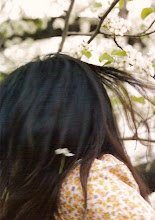After a while, we all went and stayed with him for two years in a gated neighborhood built for foreigners on the outskirts of the city. We lived between mouthless government officials and sexy European couples with kinked hair and small dogs.
In the fall, we enrolled in public school and sat still for hours of class without understanding a single word. We didn't do our homework, had no idea what the other kids were learning, and wondered why they were being punished, why not us. We kept our minds quiet and empty throughout lectures, lest we remembered how much we wanted to wiggle in our seats, to grasp something. Our teachers adored us, or at least pretended to. They would not let us go out for recess with the other students, but kept us instead with them in their chilly offices, asking us to draw them pictures and practice English with them.
At the end of each day, my brother and I sat together at the end of the long driveway and waited for our mom to come and take us home. Our classmates, otherwise silent throughout the day, crowded around us to shout and see. The one we called Ghostface cried out like a bird. He leaned in close and flipped his eyelids inside out. He laughed hard at himself, rubbing his gums and breathing in our faces. I was afraid of him but tried not to show it. Other boys wailed songs to each other in broken English, "Tink-o Tink-o Nit-o Stah!" The girls bit into shoulders, giggling in fits. It was hard for me not to hate them. I thought they hated me. I was eight years old.
Finally, we were pulled out of school and sent to take lessons from our neighbor, Auntie Marlene, who taught us about Marco Polo and Totoro. I loved Auntie Marlene, and she loved us back. She gave me my first journal. She never wore a wedding ring. Even after she moved to the hills with Frank, my brother and I were invited for sleep overs, and in the morning, after she read over my papers, she taught us how to make tea with milk and sugar.
As for the rest of the city, we came to know it by bus and maa-muu, we rode our bikes to the market, and swam in the new pools of gorgeous hotels where my dad met friends from work. My brother and I learned watercolor painting from the neighboring university's art professors, and my mom worked for hours at a budding seminary with missionaries and Chinese students. As time went on, we all learned Mandarin, we learned how to squat and pee, we learned how t0 eat from the street carts and sing the national anthem, and bargain with cloth dealers on Pet Street.
What we didn't learn was how to pass.
In all of two years, no one ever mistook us for native Chinese, even with all of our straight Chinese hair and soft Chinese noses, even in a sea of sixty other Chinese girls and boys. Through the last couple of months, we were still stopped on the streets for a photograph and a "Hello!" They still stared at my sisters on the bus and asked, "Why do you have stars on your teeth?"
Maybe we didn't want to pass. We were Americans. We were so proud of that still. That and our boxes of Kraft macaroni and cheese, our stash of Bumble Bee Tuna, and that huge plastic tub of garlic salt.

No comments:
Post a Comment